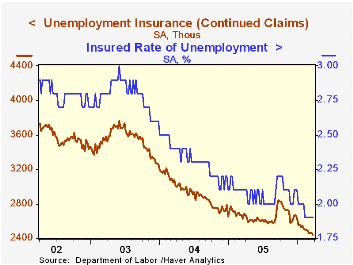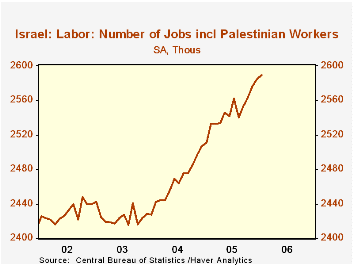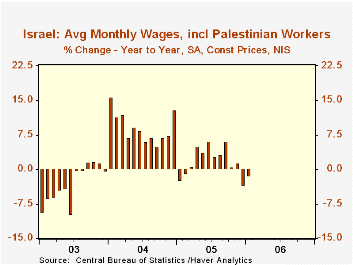 Global| Apr 06 2006
Global| Apr 06 2006Initial Claims for Jobless Insurance Below Expectations
by:Tom Moeller
|in:Economy in Brief
Summary
Initial claims for unemployment insurance dropped for the third consecutive period last week. The 5,000 person decline to 299,000 compared to Consensus expectations for 305,000 claims. It followed a 8,000 fall the prior week which was [...]

Initial claims for unemployment insurance dropped for the third consecutive period last week. The 5,000 person decline to 299,000 compared to Consensus expectations for 305,000 claims. It followed a 8,000 fall the prior week which was slightly less than initially estimated.
During the last ten years there has been a (negative) 75% correlation between the level of initial jobless insurance claims and the m/m change in payroll employment.
The four-week moving average of initial claims fell to 308,500 (-9.9% y/y).
Continuing claims for unemployment insurance fell a sharp 22,000 during the latest week following a revised decline of 1,000 the prior period, initially reported as an increase.
The insured rate of unemployment was stable at 1.9% for the seventh week.
The highest insured unemployment rates during the week ending March 18 were in Alaska (5.1%), Michigan (4.5%), Wisconsin (3.5%), Puerto Rico (3.4%), Pennsylvania (3.3%), Rhode Island (3.3%), New Jersey (3.1%), Vermont (3.1%), Massachusetts (3.0%), Connecticut (2.8%), and Oregon (2.8%).
Look Who's Working Now from the Federal Reserve Bank of St. Louis is available here.
| Unemployment Insurance (000s) | 04/01/06 | 03/25/06 | Y/Y | 2005 | 2004 | 2003 |
|---|---|---|---|---|---|---|
| Initial Claims | 299 | 304 | -13.6% | 332 | 343 | 402 |
| Continuing Claims | -- | 2,440 | -9.0% | 2,663 | 2,924 | 3,532 |
by Carol Stone April 6, 2006

The number of jobs in Israel increased 5,000 in January from December, seasonally adjusted, to 2.59 million, according to data reported today by Israel's Central Bureau of Statistics (CBS). The gain from a year ago was 79,000 jobs, or 2.9%. The CBS also publishes a subset of the jobs data that excludes foreign workers, mostly Palestinians. There were 82,000 of them in January, up from 70,000 a year ago. So the number of jobs covered by Israeli workers was 2.508 million, up just 1,000 from December and 2.7% from January 2005. Both the total number of jobs and those held by Israelis increased by 3.3% for 2005 as a whole.
The average job paid NIS7,232 for the month of January, about US$1,565. For jobs held by Israelis only, the comparable figure was NIS7,614, about US$1,648. In shekels, both total and Israeli wages were up 1.6% from a year ago. Taking account of inflation, "real" wages have fallen 1.3% for all workers and 1.0% for Israeli workers since January 2005.
While real purchasing power per job in Israel has stagnated over the last few years, the number of jobs themselves has advanced nicely. As we point out frequently here, employment in Europe is nearly at a standstill, and in the US, prior to the release tomorrow of March data, recent trends show roughly 1.5% gains in nonfarm payrolls, only about half the pace in Israel. So midst all the Middle East tension, the Israeli economy is presently able to increase jobs and overall growth as well. In industry data through Q4 2005, accommodation, trade and business services were seeing the greatest percentage job gains.
| Jan 2006 | Dec 2005 | Year Ago | 2005 | 2004 | 2003 | |
|---|---|---|---|---|---|---|
| Total Number of Jobs (thous.) | 2,590 | 2,585 | 2,511 | 2,548 | 2,466 | 2,425 |
| Yr/Yr % Change | 2.9 | 3.0 | -- | 3.3 | 2.2 | -0.7 |
| Jobs ex Foreign Workers (thous.) | 2,508 | 2,507 | 2,441 | 2,472 | 2,393 | 2,342 |
| Yr/Yr % Change | 2.7 | 2.9 | -- | 3.3 | 2.8 | -0.1 |
| Average Wages, All Jobs (NIS) | 7,232 | 7,208 | 7,138 | 7,225 | 7,000 | 6,863 |
| Yr/Yr % Change | 1.6 | -1.4 | -- | 3.3 | 2.1 | -2.3 |
| Average Wages, ex Foreign Workers (NIS) | 7,614 | 7,636 | 7,481 | 7,334 | 7,081 | 6,981 |
| Yr/Yr % Change | 1.6 | -1.2 | -- | 3.1 | 2.2 | -2.5 |
Tom Moeller
AuthorMore in Author Profile »Prior to joining Haver Analytics in 2000, Mr. Moeller worked as the Economist at Chancellor Capital Management from 1985 to 1999. There, he developed comprehensive economic forecasts and interpreted economic data for equity and fixed income portfolio managers. Also at Chancellor, Mr. Moeller worked as an equity analyst and was responsible for researching and rating companies in the economically sensitive automobile and housing industries for investment in Chancellor’s equity portfolio. Prior to joining Chancellor, Mr. Moeller was an Economist at Citibank from 1979 to 1984. He also analyzed pricing behavior in the metals industry for the Council on Wage and Price Stability in Washington, D.C. In 1999, Mr. Moeller received the award for most accurate forecast from the Forecasters' Club of New York. From 1990 to 1992 he was President of the New York Association for Business Economists. Mr. Moeller earned an M.B.A. in Finance from Fordham University, where he graduated in 1987. He holds a Bachelor of Arts in Economics from George Washington University.
More Economy in Brief
 Global| Feb 05 2026
Global| Feb 05 2026Charts of the Week: Balanced Policy, Resilient Data and AI Narratives
by:Andrew Cates






